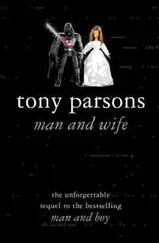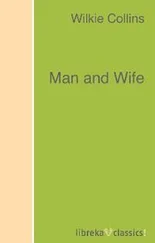Уилки Коллинз - Man and Wife
Здесь есть возможность читать онлайн «Уилки Коллинз - Man and Wife» — ознакомительный отрывок электронной книги совершенно бесплатно, а после прочтения отрывка купить полную версию. В некоторых случаях можно слушать аудио, скачать через торрент в формате fb2 и присутствует краткое содержание. Год выпуска: 2006, Жанр: Классическая проза, на английском языке. Описание произведения, (предисловие) а так же отзывы посетителей доступны на портале библиотеки ЛибКат.
- Название:Man and Wife
- Автор:
- Жанр:
- Год:2006
- ISBN:нет данных
- Рейтинг книги:3 / 5. Голосов: 1
-
Избранное:Добавить в избранное
- Отзывы:
-
Ваша оценка:
- 60
- 1
- 2
- 3
- 4
- 5
Man and Wife: краткое содержание, описание и аннотация
Предлагаем к чтению аннотацию, описание, краткое содержание или предисловие (зависит от того, что написал сам автор книги «Man and Wife»). Если вы не нашли необходимую информацию о книге — напишите в комментариях, мы постараемся отыскать её.
Man and Wife — читать онлайн ознакомительный отрывок
Ниже представлен текст книги, разбитый по страницам. Система сохранения места последней прочитанной страницы, позволяет с удобством читать онлайн бесплатно книгу «Man and Wife», без необходимости каждый раз заново искать на чём Вы остановились. Поставьте закладку, и сможете в любой момент перейти на страницу, на которой закончили чтение.
Интервал:
Закладка:
Mr. Delamayn folded up the manuscript, and put it back in his pocket.
“Right,” he said, “in every particular.”
Mr. Vanborough’s swarthy complexion slowly turned pale. He cast one furtive glance at Mr. Kendrew, and turned away again.
“Well,” he said to the lawyer, “now for your opinion! What is the law?”
“The law,” answered Mr. Delamayn, “is beyond all doubt or dispute. Your marriage with Miss Anne Silvester is no marriage at all.”
Mr. Kendrew started to his feet.
“What do you mean?” he asked, sternly.
The rising solicitor lifted his eyebrows in polite surprise. If Mr. Kendrew wanted information, why should Mr. Kendrew ask for it in that way? “Do you wish me to go into the law of the case?” he inquired.
“I do.”
Mr. Delamayn stated the law, as that law still stands—to the disgrace of the English Legislature and the English Nation.
“By the Irish Statute of George the Second,” he said, “every marriage celebrated by a Popish priest between two Protestants, or between a Papist and any person who has been a Protestant within twelve months before the marriage, is declared null and void. And by two other Acts of the same reign such a celebration of marriage is made a felony on the part of the priest. The clergy in Ireland of other religious denominations have been relieved from this law. But it still remains in force so far as the Roman Catholic priesthood is concerned.”
“Is such a state of things possible in the age we live in!” exclaimed Mr. Kendrew.
Mr. Delamayn smiled. He had outgrown the customary illusions as to the age we live in.
“There are other instances in which the Irish marriage-law presents some curious anomalies of its own,” he went on. “It is felony, as I have just told you, for a Roman Catholic priest to celebrate a marriage which may be lawfully celebrated by a parochial clergyman, a Presbyterian mini ster, and a Non-conformist minister. It is also felony (by another law) on the part of a parochial clergyman to celebrate a marriage that may be lawfully celebrated by a Roman Catholic priest. And it is again felony (by yet another law) for a Presbyterian minister and a Non-conformist minister to celebrate a marriage which may be lawfully celebrated by a clergyman of the Established Church. An odd state of things. Foreigners might possibly think it a scandalous state of things. In this country we don’t appear to mind it. Returning to the present case, the results stand thus: Mr. Vanborough is a single man; Mrs. Vanborough is a single woman; their child is illegitimate, and the priest, Ambrose Redman, is liable to be tried, and punished, as a felon, for marrying them.”
“An infamous law!” said Mr. Kendrew.
“It is the law,” returned Mr. Delamayn, as a sufficient answer to him.
Thus far not a word had escaped the master of the house. He sat with his lips fast closed and his eyes riveted on the table, thinking.
Mr. Kendrew turned to him, and broke the silence.
“Am I to understand,” he asked, “that the advice you wanted from me related to this? ”
“Yes.”
“You mean to tell me that, foreseeing the present interview and the result to which it might lead, you felt any doubt as to the course you were bound to take? Am I really to understand that you hesitate to set this dreadful mistake right, and to make the woman who is your wife in the sight of Heaven your wife in the sight of the law?”
“If you choose to put it in that light,” said Mr. Vanborough; “if you won’t consider—”
“I want a plain answer to my question—‘yes, or no.’”
“Let me speak, will you! A man has a right to explain himself, I suppose?”
Mr. Kendrew stopped him by a gesture of disgust.
“I won’t trouble you to explain yourself,” he said. “I prefer to leave the house. You have given me a lesson, Sir, which I shall not forget. I find that one man may have known another from the days when they were both boys, and may have seen nothing but the false surface of him in all that time. I am ashamed of having ever been your friend. You are a stranger to me from this moment.”
With those words he left the room.
“That is a curiously hot-headed man,” remarked Mr. Delamayn. “If you will allow me, I think I’ll change my mind. I’ll have a glass of wine.”
Mr. Vanborough rose to his feet without replying, and took a turn in the room impatiently. Scoundrel as he was—in intention, if not yet in act—the loss of the oldest friend he had in the world staggered him for the moment.
“This is an awkward business, Delamayn,” he said. “What would you advise me to do?”
Mr. Delamayn shook his head, and sipped his claret.
“I decline to advise you,” he answered. “I take no responsibility, beyond the responsibility of stating the law as it stands, in your case.”
Mr. Vanborough sat down again at the table, to consider the alternative of asserting or not asserting his freedom from the marriage tie. He had not had much time thus far for turning the matter over in his mind. But for his residence on the Continent the question of the flaw in his marriage might no doubt have been raised long since. As things were, the question had only taken its rise in a chance conversation with Mr. Delamayn in the summer of that year.
For some minutes the lawyer sat silent, sipping his wine, and the husband sat silent, thinking his own thoughts. The first change that came over the scene was produced by the appearance of a servant in the dining-room.
Mr. Vanborough looked up at the man with a sudden outbreak of anger.
“What do you want here?”
The man was a well-bred English servant. In other words, a human machine, doing its duty impenetrably when it was once wound up. He had his words to speak, and he spoke them.
“There is a lady at the door, Sir, who wishes to see the house.”
“The house is not to be seen at this time of the evening.”
The machine had a message to deliver, and delivered it.
“The lady desired me to present her apologies, Sir. I was to tell you she was much pressed for time. This was the last house on the house agent’s list, and her coachman is stupid about finding his way in strange places.”
“Hold your tongue, and tell the lady to go to the devil!”
Mr. Delamayn interfered—partly in the interests of his client, partly in the interests of propriety.
“You attach some importance, I think, to letting this house as soon as possible?” he said.
“Of course I do!”
“Is it wise—on account of a momentary annoyance—to lose an opportunity of laying your hand on a tenant?”
“Wise or not, it’s an infernal nuisance to be disturbed by a stranger.”
“Just as you please. I don’t wish to interfere. I only wish to say—in case you are thinking of my convenience as your guest—that it will be no nuisance to me. ”
The servant impenetrably waited. Mr. Vanborough impatiently gave way.
“Very well. Let her in. Mind, if she comes here, she’s only to look into the room, and go out again. If she wants to ask questions, she must go to the agent.”
Mr. Delamayn interfered once more, in the interests, this time, of the lady of the house.
“Might it not be desirable,” he suggested, “to consult Mrs. Vanborough before you quite decide?”
“Where’s your mistress?”
“In the garden, or the paddock, Sir—I am not sure which.”
“We can’t send all over the grounds in search of her. Tell the house-maid, and show the lady in.”
The servant withdrew. Mr. Delamayn helped himself to a second glass of wine.
“Excellent claret,” he said. “Do you get it direct from Bordeaux?”
There was no answer. Mr. Vanborough had returned to the contemplation of the alternative between freeing himself or not freeing himself from the marriage tie. One of his elbows was on the table, he bit fiercely at his finger-nails. He muttered between his teeth, “What am I to do?”
Читать дальшеИнтервал:
Закладка:
Похожие книги на «Man and Wife»
Представляем Вашему вниманию похожие книги на «Man and Wife» списком для выбора. Мы отобрали схожую по названию и смыслу литературу в надежде предоставить читателям больше вариантов отыскать новые, интересные, ещё непрочитанные произведения.
Обсуждение, отзывы о книге «Man and Wife» и просто собственные мнения читателей. Оставьте ваши комментарии, напишите, что Вы думаете о произведении, его смысле или главных героях. Укажите что конкретно понравилось, а что нет, и почему Вы так считаете.








